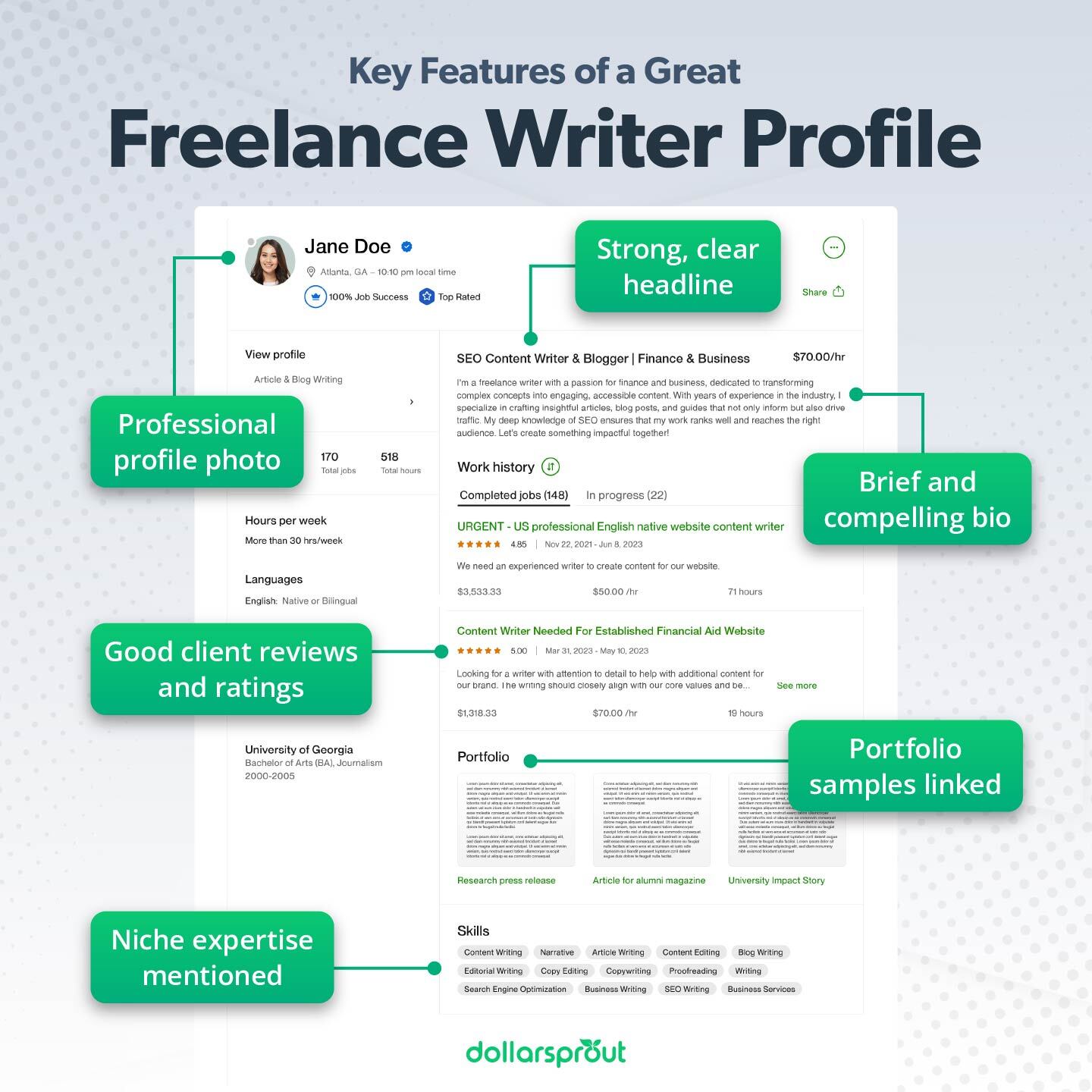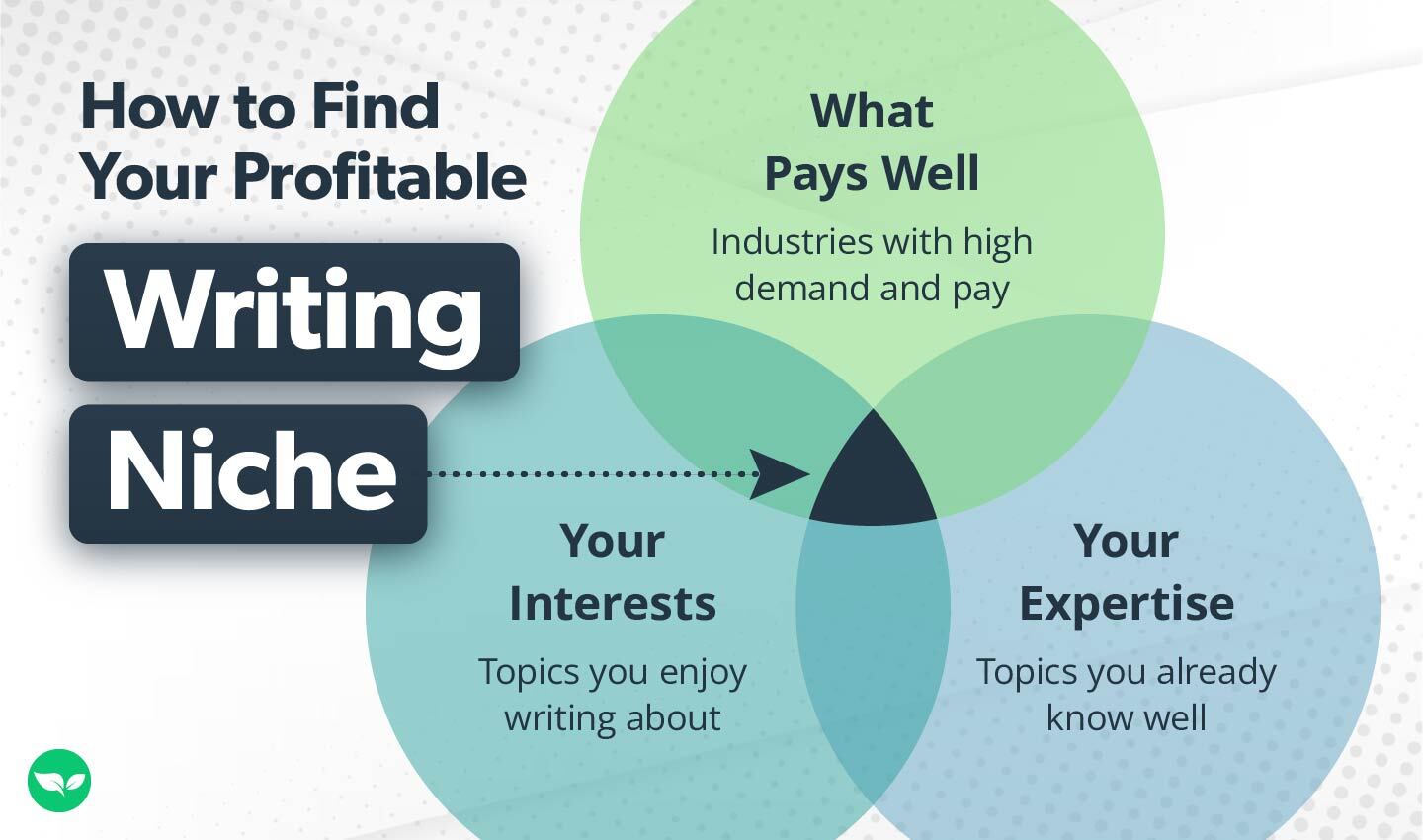How to Become a Freelance Writer & Land High-Paying Clients
Learn how to start and grow a freelance writing career, build a portfolio, land high-paying clients, and scale your income with this step-by-step guide.

Some of the links on DollarSprout point to products or services from partners we trust. If you choose to make a purchase through one, we may earn a commission, which supports the ongoing maintenance and improvement of our site at no additional cost to you. Learn more.
Freelance writing is one of the most accessible ways to make money online—whether as a side hustle or a full-time career. Unlike traditional jobs, there are no degrees, certifications, or prior experience required. If you can write well and market yourself effectively, you can land paid work.
That said, the landscape is evolving. AI-generated content has flooded the web, making it more important than ever for freelancers to focus on the skills AI can’t replicate—original research, storytelling, in-depth analysis, and niche expertise. While AI can assist with drafting and structuring, businesses still need skilled writers who can create high-quality, human-centric content.
The demand for writers remains strong. The Bureau of Labor Statistics projects a 5% growth in writing jobs from 2023 to 2033[1], keeping pace with digital media, content marketing, and specialized industries like finance and healthcare. Some freelancers earn six figures, but long-term success requires more than just writing ability—it takes strategic pricing, client outreach, and continuous skill development.
This guide breaks down everything you need to know, from building a portfolio and choosing a profitable niche to landing clients and increasing your rates. Whether you’re starting from scratch or scaling an existing freelance business, these steps will help you build a sustainable writing career.
Freelance Writing: What It Is (and Isn’t)
Freelance writing is the practice of writing for clients as an independent contractor rather than being employed by a single company. Writers in this field take on assignments ranging from blog content and copywriting to technical documents and white papers.
But freelance writing isn’t just about picking up one-off gigs. The most successful writers treat it like a business—specializing in high-value niches, building relationships with recurring clients, and positioning themselves as experts. Many earn steady incomes by securing ongoing contracts rather than constantly searching for new work.
Demand for freelance writers remains strong. A recent Upwork report found that 60 million Americans did freelance work in 2023, with writing and content creation among the most sought-after skills.[2] As companies expand their digital presence, they need skilled writers to produce blog content, marketing copy, and technical documentation.
Freelance writing offers unmatched flexibility. Writers set their own rates, choose their clients, and work on topics that align with their expertise. Some start with platforms like Upwork or Fiverr, while others pitch directly to businesses and publications.
Is Freelance Writing Right for You?
Freelance writing is one of the easiest careers to break into, even without formal credentials or industry experience. If you can write clearly and are willing to learn, you can start landing paid work. However, thriving as a freelancer takes more than just writing skills. Success depends on persistence, adaptability, and the ability to market yourself effectively.
Key Skills You’ll Need
Like any profession, freelance writing requires specific skills that improve with practice. If you’re willing to put in the effort, you can build a profitable career. The most essential skills include:
- Writing & Editing. Clear, engaging writing with strong grammar and structure.
- Time Management. Meeting deadlines and handling multiple projects efficiently.
- Marketing & Self-Promotion. Finding clients, pitching effectively, and building your brand.
Freelance writing might be a good fit if you:
- Enjoy researching and writing about different topics.
- Work well independently and are self-motivated.
- Can handle constructive criticism and revise accordingly.
- Are comfortable pitching clients and networking.
- Want the flexibility to work from anywhere—including your couch.
Who Should (or Shouldn’t) Become a Freelance Writer?
Freelance writing stands out for its accessibility—your skills matter far more than formal education or past job titles. But while it’s accessible, success depends on persistence, adaptability, and a willingness to market yourself.
Many writers start freelancing while working full-time, using their spare hours to build a portfolio and gain experience. Holly Johnson did just that—taking on writing projects in the evenings and weekends until she had enough steady income to quit her job. Over time, she refined her skills, secured high-paying clients, and turned her side hustle into a six-figure writing career.
[su_testimonial name=”Holly Johnson” photo=”https://dollarsprout.com/wp-content/uploads/Holly-Johnson-min.jpg” company=”ClubThrifty”]“My initial goal was earning $3,000 per month freelancing so I could quit my job. I wanted a way to work from home for a better quality of life, even if it meant earning less.”
[/su_testimonial]Her story isn’t unique. Many freelancers start small—writing between college classes, during slow work periods, or on weekends—and gradually grow their business into a full-time career.
Javier Bargas-Avila, another DollarSprout reader, followed a similar path but took a different approach. A former journalism student, he built his freelance income by leveraging academic writing gigs before pivoting into digital content. By honing his niche expertise and mastering direct outreach, he scaled his business rapidly—earning $1.5 million in just 18 months, far exceeding what a traditional newsroom job would have offered him.
If you’re unsure whether this path is right for you, start small. Take on a few projects, build your portfolio, and see if freelancing aligns with your strengths and lifestyle.
7 Steps to Becoming a Freelance Writer
1. Build Foundational Skills
Strong writing skills are the backbone of a successful freelance career, but they aren’t just about talent—they’re built through practice, feedback, and refining your craft over time. Mastering clarity, grammar, and persuasive writing is key, but today’s most in-demand writers also understand SEO, content marketing, and audience engagement. After all, even the best-written piece won’t matter if it’s buried on page 27 of Google. Knowing how to optimize content so it reaches the right audience and drives results for clients—whether that’s traffic, leads, or sales—can set you apart in a crowded market.
If you’re just starting out, take advantage of free resources such as blogs, writing guides, and webinars to build a solid foundation. However, structured education can accelerate your progress and provide deeper industry insights.
Investing in reputable courses like Freelance Writers Den—one of the most well-regarded freelance writing programs—can help you master freelance-specific writing techniques, craft compelling pitches, and gain access to mentorship and a professional support network. It’s not just a course; it’s a shortcut to learning what works, avoiding common mistakes, and getting real-world guidance from experienced writers who’ve built successful careers.
Additionally, actively writing—whether through a personal blog, guest posts, or mock assignments (more details on that below)—will help refine your style and build confidence. The key is to balance learning with practice, focusing on real-world applications rather than getting overwhelmed by too many tools or strategies at once.
AI is changing the writing landscape, but rather than replacing freelance writers, it’s becoming a valuable tool for improving efficiency. Writers who learn to use AI strategically—for research, SEO insights, and structuring drafts—will have a competitive edge.
Examples of AI-Assisted Writing Tasks:
- Refining grammar & clarity → Grammarly, ProWritingAid
- Generating outlines & research insights → ChatGPT, Jasper
- Optimizing content for SEO → Surfer SEO, Clearscope
However, relying solely on AI risks producing generic content that lacks the personal voice and originality that clients value. Instead, writers should view AI as an assistant—use it to brainstorm headlines, simplify repetitive tasks, or polish drafts. For example, leverage AI to rephrase awkward sentences or analyze SEO keywords for blog posts.
A valuable hack is to feed AI a well-crafted prompt to generate structured outlines or examples, which can save time during the research phase. Remember, the best results come from combining the efficiency of AI with the writer’s expertise and unique perspective.
⚠️ Important: While AI can enhance efficiency, some publications and clients strictly prohibit its use. Always clarify expectations before incorporating AI-assisted writing to avoid violating project guidelines.
That said, misusing AI or failing to disclose its role in your work can damage credibility and burn bridges in the industry—something no freelance writer can afford.
2. Create an Impressive Portfolio
A strong portfolio is essential for landing freelance writing gigs—it serves as proof of your skills, expertise, and ability to meet client expectations. Since most clients won’t hire a writer without seeing examples of their work, having a polished, accessible portfolio is a must.
One of the best ways to showcase your writing is by creating your own website. Hosting platforms like Bluehost and other affordable services make it easy to set up a professional-looking site, whether you opt for a simple, static portfolio or a full-featured WordPress blog where you can publish your own content. A personal website not only displays your work but also strengthens your credibility and makes it easier for potential clients to find you online. Much like a resume that keeps being updated, my wife keeps her portfolio updated with the best samples of her writing career to quickly share with prospective clients.
If launching a website feels like too much right now, guest writing on established websites is a great way to build authority and get published samples. Platforms like Medium, LinkedIn Articles, or niche industry blogs allow you to demonstrate your expertise while expanding your reach.

Additionally, freelancing platforms like Upwork, Freelancer, and ProBlogger offer portfolio sections where you can upload samples. If you don’t have published work yet, consider creating mock samples that align with the types of clients you want to attract.
For example, if you want to write for SaaS companies, craft a sample blog post reviewing a software tool. If you’re targeting personal finance, write an article about budgeting or investing.
A well-crafted portfolio—whether through a personal website, guest contributions, or platform-based samples—will significantly boost your credibility and help you land your first freelance writing job.
[su_testimonial name=”Holly Johnson” photo=”https://dollarsprout.com/wp-content/uploads/Holly-Johnson-min.jpg” company=”ClubThrifty”]After all, it will be more difficult for people to hire you if they cannot read some of your writing samples online.
[/su_testimonial]3. Identify Profitable Niches
Identifying a profitable niche is key to earning premium rates as a freelance writer. High-demand areas like technology (SaaS), health and wellness, and personal finance often pay more for specialized expertise – having a background in these can help you gain traction quickly.
While being a generalist offers variety, specializing can position you as an authority, making it easier to command higher rates. I recommend experimenting with both approaches to see what suits your interests and career goals.
To choose a niche, consider your skills, passions, and market demand.

A simple exercise: list your top three areas of expertise, topics you enjoy writing about, and industries willing to pay well. Where these overlap is your sweet spot.
The better you define your passions, hobbies, interests, or areas of expertise, the easier it will be to find freelance writing jobs that match your skill set.
[su_testimonial name=”Holly Johnson” photo=”https://dollarsprout.com/wp-content/uploads/Holly-Johnson-min.jpg” company=”ClubThrifty”]To be clear, you don’t have to confine yourself to one specific topic. However, it can help if you have some expertise in a specific area.
[/su_testimonial]For example, if you’ve worked in marketing for a decade and can authoritatively speak on various marketing topics, it will be easier for you to land freelance writing clients in that niche as opposed to something you have no personal experience with.
4. Finding Freelance Clients
Once you have a portfolio and a clear niche, the next step is landing your first clients. This can feel overwhelming at first, but the good news is clients are actively looking for quality writers—the key is knowing where to find them and how to stand out.
Where to Find Freelance Writing Gigs
There are multiple ways to connect with opportunities, even as a beginner:
- Freelance Job Boards. Established platforms like ProBlogger, Upwork, and Freelancer list thousands of writing gigs daily.
- Industry-Specific Job Boards. Some niches, like tech and finance, have dedicated job boards where companies look for specialized writers. Examples include MediaBistro (for media jobs) and Behance (for creative roles).
- LinkedIn Inbound Leads. Optimize your LinkedIn profile by including “Freelance [Your Niche] Writer” in your headline and regularly sharing writing-related content.
- Guest Posting on Industry Blogs. Publishing free guest posts on well-known sites in your niche helps establish authority and can lead to direct client inquiries. For example, a well-placed article on a marketing blog can attract marketing agencies looking for content writers.

Pitching Clients
A personalized pitch can increase response rates by 30% compared to generic outreach. When reaching out to potential clients, focus on:
- Researching the company and referencing a recent blog post or project.
- Highlighting how your expertise directly benefits their business.
- Including relevant samples that match the client’s industry.
A basic pitch might say:
Leverage Warm Outreach & Referrals
If you’ve worked with past clients, colleagues, or even professors, reach out and let them know you’re available for freelance work. Many businesses prefer referrals over job boards, and simply mentioning your services can lead to unexpected opportunities.
Pro Tip: Even one well-placed guest post, LinkedIn post, or referral can open doors to multiple clients. Start small, stay consistent, and refine your outreach as you gain experience.
Build Experience with Guest Blogging & Small Business Projects
If you’re struggling to land paid work right away, consider guest blogging for established websites or writing for small businesses that need content but may not know where to start. There may even be scenarios where it makes sense to write for free to expand your portfolio. These beginner-friendly opportunities help you build experience, expand your portfolio, and establish credibility, making it easier to secure higher-paying gigs down the line.
[su_testimonial name=”Holly Johnson” photo=”https://dollarsprout.com/wp-content/uploads/Holly-Johnson-min.jpg” company=”ClubThrifty”]“It’s not too difficult to get more ongoing work when you have a few clients. What’s difficult is getting your very first writing job…You have to find that one person willing to give you a chance.”
[/su_testimonial]5. Master Marketing Strategies
Mastering marketing is non-negotiable for freelance success. Here’s how to consistently attract clients:
- Build a Strong Online Presence
- Optimize LinkedIn with clear positioning (e.g., “Freelance SEO Content Writer for SaaS”).
- Ensure your email and domain look professional (e.g., “yourname@yourwebsite.com”).
- Leverage PR for Visibility & Authority
- Use Qwoted to get featured in articles.
- Share your success story—editors & businesses may discover you through media mentions.
- Cold Pitch with a Personal Touch
- Research each client before pitching to show relevance.
- Keep your email concise & benefit-driven (highlight past results).
Action Step:
Set up a professional email signature with your headshot, LinkedIn, and portfolio link to immediately establish credibility when pitching.
6. Focus on Client Retention
Finding new clients is essential, but retaining them is what builds a sustainable and profitable freelance writing career. Long-term client relationships reduce the constant need for prospecting and create a steady stream of reliable income. In fact, according to the Harvard Business Review, a new client can cost 5x what it does to keep a current one. The key to retention lies in consistent communication, meeting deadlines, and over-delivering value—clients are far more likely to keep working with writers who make their lives easier.
Beyond delivering great content, proactively offering additional value can set you apart. This might include suggesting SEO improvements, repurposing content for social media, or identifying topics that align with their audience’s needs.
Position yourself as a strategic partner rather than just a writer, and clients will be more inclined to stick with you.
Additionally, referrals from existing clients can be one of the most powerful ways to grow your business. Once you’ve built a strong working relationship, don’t hesitate to ask satisfied clients if they know anyone else who might need a writer. A single referral can be worth dozens of cold pitches, making client retention one of the most effective ways to scale your freelance writing career.
7. Beginner Mistakes That Can Cost You Clients
Starting out as a freelance writer comes with challenges, but avoiding common pitfalls can help you build a sustainable and profitable career faster
One of the biggest mistakes new writers make is undercharging for their work. Setting fair, competitive rates ensures that you’re valuing your time appropriately and not working for less than you’re worth.
Holly recommends that beginners establish a minimum hourly rate as a baseline for setting project rates:
[su_testimonial name=”Holly Johnson” photo=”https://dollarsprout.com/wp-content/uploads/Holly-Johnson-min.jpg” company=”ClubThrifty”]“Set a minimum hourly rate you’re willing to work for and set your per-piece rates from there … This doesn’t mean you’ll write hourly. It just means you will only take on assignments that result in your hourly minimum rate or more. This works best when you are able to estimate how long a project will take you, however, your predictions will become more accurate with time.”
[/su_testimonial]For example, if you decide you want to make at least $50 per hour and estimate that writing a 1,500-word article will take three hours, you should charge $150 per article, or $0.10 per word.
In addition to setting appropriate rates, managing your workload effectively is crucial. Overcommitting can lead to burnout and missed deadlines, which can damage your reputation. Establish clear contracts and maintain regular communication with clients to ensure expectations are aligned from the start.
Finally, be cautious of scams and low-paying gigs. Common red flags include:
- Unprofessional or gimmicky websites or email addresses.
- Vague or unclear job requirements.
- Clients who are difficult to reach or frequently unresponsive.
- Unreasonable feedback or requests that seem illogical.
- Asking for free samples or unpaid work beyond the initial scope.
By setting clear boundaries, pricing your services appropriately, and staying vigilant about potential scams, you can avoid many of the pitfalls that hold new freelance writers back.
Overcoming Challenges
Every freelance writer, no matter how experienced, faces challenges along the way. The key to long-term success isn’t avoiding difficulties—it’s learning how to navigate them effectively.
Rejection is inevitable, but it’s also a valuable learning opportunity. Rather than seeing a declined pitch as a failure, use it as a chance to refine your approach. Analyze what worked, what didn’t, and how you can improve. Many successful writers, including Holly and my wife, faced numerous rejections before landing sustainable work.
[su_testimonial name=”Casey Watson” photo=”https://dollarsprout.com/wp-content/uploads/2025/02/1544470575369.jpeg”]“Personally, I don’t get hired from face-to-face interviews with complete strangers – I’m a tiny woman who has a very naïve look about me – but if I can send my writing portfolio without the interview, I almost always get hired.”
[/su_testimonial]Imposter syndrome is another common struggle, especially for new freelancers. Doubting your abilities or feeling like you’re not “qualified” enough can hold you back, but the truth is that every writer starts somewhere. Focusing on your progress, tracking milestones, and celebrating small wins—like getting positive feedback or securing a repeat client—can help quiet that inner critic.
To avoid burnout, set realistic work limits, prioritize tasks, and take breaks when needed. Many freelancers fall into the trap of saying “yes” to every opportunity, only to find themselves overwhelmed. Learning to pace yourself and structure your workload ensures that you can maintain quality and longevity in your career.
Scaling Your Freelance Writing Career
Scaling your freelance writing career is about maximizing your income while optimizing your workload. As you gain experience, you’ll want to transition from low-paying, high-effort work to high-value, scalable opportunities. This process doesn’t happen overnight, but with intentional steps, we’ve found you can steadily increase your earnings and workload efficiency.
How to incrementally scale your freelance writing business:
- Polish Your Client Acquisition Skills
Finding high-quality clients is essential for building a sustainable writing business. If you’re still relying on low-paying job boards, it’s time to refine your approach. Networking, cold pitching, and leveraging referrals can help you land higher-paying contracts. A strong, client-focused pitch makes a significant difference in response rates. - Raise Your Rates Gradually Without Losing Clients
As you gain experience, test incremental rate increases with new clients. If no one pushes back, you’re likely undercharging. For existing clients, provide advance notice and emphasize the value you’ve delivered. If clients hesitate, highlight past results, compare market rates, or offer a brief transition period before new pricing takes effect. Not all clients will accept rate increases, and that’s okay—focus on securing higher-paying work over time. - Optimize Your Presence to Find Clients at Scale
A well-optimized LinkedIn profile, personal website, and portfolio can attract inbound leads, reducing your reliance on outreach. Make sure your profiles showcase your niche expertise, past results, and client testimonials. Platforms like Upwork, ProBlogger, and Contently can also generate leads when set up strategically. - Leverage PR & Share Your Success Story
Getting featured in media outlets can significantly boost your credibility. Use platforms like Qwoted to connect with journalists, or contribute guest posts to industry sites. When businesses see you as a recognized expert, inbound opportunities become more frequent. - Expand into High-Value, Scalable Services
Freelance writers who offer complementary services often command higher rates. Consider expanding into SEO consulting, content strategy, or editorial audits. These services require minimal extra effort but can significantly increase your earning potential. - Build Passive Income as a Freelance Writer
Creating passive income streams can reduce your dependence on client work. Launching a blog in a high-demand niche allows you to monetize through affiliate marketing and digital products. Another option is selling writing templates or guides on platforms like Gumroad or your own website. - Offer a Writing Course or Membership
Teaching others how to freelance can be a profitable extension of your career. Many successful freelancers have scaled their businesses by launching courses, memberships, or coaching programs. If you’ve established yourself as an expert, consider leveraging platforms like Teachable or Podia to create and sell courses efficiently
Scaling a freelance writing career isn’t just about working harder—it’s about working smarter. As you refine your niche, optimize your presence, and build passive income, you’ll create a writing career that fits your lifestyle, income goals, and long-term vision.
Your Freelance Writing Journey Starts Here
Freelance writing offers a rare combination of flexibility, creative fulfillment, and financial potential—but success doesn’t happen overnight. Whether you’re looking to supplement your income or build a full-time business, taking action is what separates hobbyists from professionals. Start by refining your skills, building a portfolio, and reaching out to potential clients. The more you write, pitch, and learn, the more confident and in-demand you’ll become.
Some writers, like Holly Johnson, have turned freelance writing into a six-figure career—not by luck, but by continuously improving their craft, charging what they’re worth, and retaining high-quality clients. Your path might look different, but the opportunity is there if you’re willing to put in the work.
The best way to move forward? Take the first step today. Whether that’s setting up your portfolio, sending your first pitch, or investing in a professional course like Freelance Writers Den, small, consistent actions will move you closer to your goals.
Sources:







